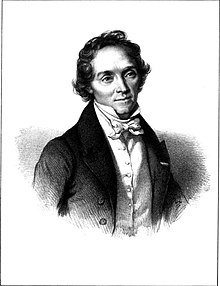Casimir Delavigne
Jean François Casimir Delavigne (born April 4, 1793 in Le Havre , † December 11, 1843 in Lyon ) was a French poet.
Life
Already as a pupil of the Lycée Napoléon in Paris, Delavigne demonstrated unusual poetic talent with a dithyramb on the birth of Napoleon II (1811), the son of Napoleon Bonaparte . In 1813 his dithyramb appeared on the death of the poet Jacques Delilles , in 1814 his poem Charles XII à Narva, in 1815 La découverte de la vaccine, with which he won the first subsidiary prize from the Académie française , and in 1818 his Messéniennes , which became very popular. These political lamentations were the product of ardent patriotism after Napoleon's defeat.
Delavigne received the post as librarian at the State Chancellery, but lost it again in 1822 when he sang the Greek liberation struggle (see Greek Revolution ) in new "Messéniennes" . The Duke of Orléans , who later became King ( Ludwig Philipp ) , made him librarian at the Palais Royal ; he held this office until his death.
Delavigne also worked as a playwright: in 1819 he wrote the tragedy Vêpres Siciliennes , which was very successful despite being rejected by the Théâtre français . This piece was followed by the comedy Les Comédiens (1820), the tragedy Le Paria (1821) and the comedies L'école des vieillards (1823) and La princesse Aurélie (1828). The former, his best comedy, earned him a seat in the Académie française in 1825 . Delavigne turned down a pension that Charles X offered him.
From a trip to Italy, which he made because of his weakened health, he brought back, in addition to seven new messéniennes, a significant change in his poetic views, which was first documented in the tragedy Marino Faliero in 1829 . For if Delavigne had previously followed the rules of classical drama as closely as possible, he was now approaching the romantic camp with the intention of reconciling the two schools.
His attempt was brilliantly successful. The July Revolution of 1830 inspired him to the popular songs: La Parisienne (composed by Daniel-François-Esprit Auber ), La Varsovienne and others. Two of his best Messéniennes: Une semaine à Paris and Le chien du Louvre. In 1832 his Louis XI was performed, like Marino Faliero, a mixture of the tragic and the light genre , but more decidedly indulging in contemporary tastes.
The tragedy Les enfants d'Edouard (1833) and, above all, the comedy Don Juan d'Autriche (1835) are among the poet's best pieces because of the liveliness of the plot and its own poetic verve.
The one-act tragedy Une famille au temps de Luther (1836), like the political comedy La popularité (1838) and the tragedy La fille du Cid (1839), aroused only moderate interest.
His last works were the comedy Le conseiller-rapporteur (1841) and the text written with his brother Germain Delavigne for the opera Charles VI (1843, music by Jacques Fromental Halévy ).
Alongside Pierre-Jean de Béranger, Delavigne is the main representative of the liberal direction in French literature of the time. With great skill and taste he knew how to dress the mood of the people, their hatred and their love, in poetic forms. Delavigne is mainly a poet, some of his poems, especially the choirs of the Pariah, surprise with their warmth and intimacy of feeling, elegance and purity of expression.
On the one hand, his style closely follows the classic Jean Racine and, on the other hand, especially since his Louis XI, he has allowed himself certain freedoms that no longer corresponded to strict, classic taste.
literature
- Casimir Delavigne . In: Illustrirte Zeitung . No. 36 . J. J. Weber, Leipzig March 2, 1844, p. 145-146 ( books.google.de ).
Web links
- Literature by and about Casimir Delavigne in the catalog of the German National Library
- Works by and about Casimir Delavigne in the German Digital Library
- Short biography and list of works of the Académie française (French)
| personal data | |
|---|---|
| SURNAME | Delavigne, Casimir |
| ALTERNATIVE NAMES | Delavigne, Jean François Casimir |
| BRIEF DESCRIPTION | French poet |
| DATE OF BIRTH | April 4, 1793 |
| PLACE OF BIRTH | Le Havre |
| DATE OF DEATH | December 11, 1843 |
| Place of death | Lyon |


